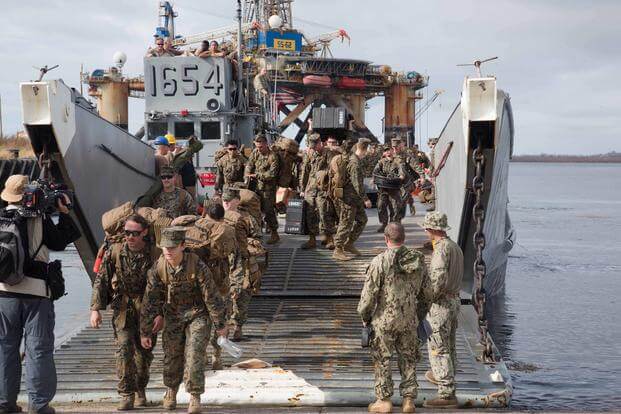Joint Chiefs Chairman Gen. Joseph Dunford assured the Senate Tuesday that the military was going full throttle to assist Puerto Rico in a relief effort currently limited by damaged ports and airfields.
"We do have the capability," Dunford said, but the aid "can't come in until we get the ports and airfields open."
Defense Secretary Jim Mattis has given the military a simple mission in Puerto Rico and the U.S. Virgin Islands: "What they need is what they get. Make it happen," Dunford told the Senate Armed Services Committee at his confirmation hearing on a second, two-year term as the top military advisor to the President.
At the White House later, President Donald Trump echoed Dunford on the limited access to Puerto Rico while defending the administration's response to Hurricane Maria in comparison to the relief and recovery efforts after Hurricanes Irma and Harvey.
"We have shipped massive amounts of food and water and supplies to Puerto Rico, and we are continuing to do it on an hourly basis," Trump said, but "it's very tough because it's an island. In Texas, we can ship the trucks right out there."
"And you know, we've gotten A-pluses on Texas and on Florida, and we will also on Puerto Rico. But the difference is, this is an island sitting in the middle of an ocean. And it's a big ocean, it's a very big ocean. And we're doing a really good job," Trump said.
At a meeting with House leaders on taxes, Trump said he would be going to Puerto Rico, and the Virgin Islands, next Tuesday, to have his trip avoid interfering with the work of first responders.
"Puerto Rico is very important to me, and Puerto Rico -- the people are fantastic people," Trump said. "I grew up in New York, so I know many people from Puerto Rico. I know many Puerto Ricans. And these are great people, and we have to help them. The island is devastated."
Dunford testified amid growing criticism of the timeliness of the U.S. civilian and military response to Hurricane Maria's Category 5 direct hit on the island that knocked out power and communications, caused widespread flooding and left thousands homeless.
When asked by Sen. Richard Blumenthal, D-Connecticut, whether the military could do more, Dunford said "If there is, we'll be doing it." The relief effort for the military was "both professional and personal," Dunford said in a reference to service members who have families in Puerto Rico.
"These are Americans," Dunford said of the 3.4 million U.S. citizens of Puerto Rico, "and we're going to do everything we can to help them out."
The immediate needs in Puerto Rico were for fresh water, food, fuel, generators and medical assistance, Dunford said, and "we're looking around the corner to see what they might need next week."
House Minority Leader Nancy Pelosi, D-California, former presidential candidate Hillary Clinton and others have questioned whether the Trump administration's response to Hurricane Maria has fallen short of the relief efforts after Hurricanes Harvey and Irma in Texas and Florida.
"The Trump Administration must act immediately to make available additional Department of Defense resources for search-and-rescue operations, law enforcement and transportation needs," Pelosi said in a statement.
At least 10 have died in Puerto Rico in the aftermath of Hurricane Maria, and nearly all of the 1.6 million electric customers on the island are without power, according to the Federal Emergency Management Administration.
"We have a lot of work to do," FEMA Director Brock Long said on visit to Puerto Rico Monday.
Puerto Rican officials said that medical emergencies were increasing because of the lack of resources.
"We are finding dialysis patients that haven't been able to contact their providers, so we are having to transport them in near-death conditions," San Juan Mayor Carmen Yulin Cruz told CNN.
"We are finding people whose oxygen tanks are running out" for the lack of diesel fuel for generators, Yulin said.
Between the Coast Guard and the Navy, the U.S. has 16 ships involved in relief in Puerto Rico and the U.S. Virgin Islands, including the Amphibious Ready Group led by the amphibious assault ship Kearsarge, FEMA Director Long said at the White House Tuesday.
The Kearsarge has Marines from the 26th Marine Expeditionary Unit, based at Camp Lejeune, North Carolina, aboard. At least another 10 ships were on the way or preparing to debark to the area, Long said.
At the direction of FEMA and local governors, U.S. Northern Command has overall responsibility for the military response in Puerto Rico and the Virgin Islands, while U.S. Southern Command working through the State Department was focusing on the Caribbean's Leeward Islands.
As repairs to air traffic control systems continue, NorthCom estimated that the traffic flow to airfields in Puerto Rico and the Virgin Islands will increase dramatically over the next 24 hours -- from 3-6 aircraft per hour to 10 per hour for a total of about 240 aircraft per day, the Defense Department said in a statement.
DoD estimated that about 44 percent of Puerto Rico's 3.4 million residents have no access to fresh water, and only 11of 69 hospitals have fuel or power.
The Puerto Rico Electric Power Authority reported that generators on the island are operational, but 80% of the transmission system and 100% of the distribution system are damaged.
The U.S. Army Corps of Engineers was assisting in power supply at hospitals with generators acquired by the Defense Logistics Agency and shipped by U.S. Transportation Command, DoD said.
The Corps of Engineers was also assisting Puerto Rican officials in assessments and repairs for the Guajataca Dam in the northwestern area of the island which had been reported in danger of collapse.
At the dam site, the Corps of Engineers "found it intact but in need of reinforcement to ensure stability" and prevent collapse, DoD said.
--Richard Sisk can be reached at Richard.Sisk@Military.com.


























